” The surrogacy process should be safe, ethical, and clearly defined for everyone involved. “
– SurrogateFirst Agency
Introduction: When Surrogacy Goes Wrong
When headlines like California couple accused of tricking women into surrogacy scam make national news July 2025, it sends a chilling reminder to every hopeful surrogate and intended parent: not all surrogacy journeys are built on trust. In this recent case, multiple women were misled into becoming surrogates under false pretenses by a Southern California couple now facing federal charges. No agency support, no contracts, and no protection, just manipulation disguised as a family-building dream.

Booking photos of Guojun Xuan, Silvia Zhang
Situations like this expose a harsh reality. The surrogacy process should be safe, ethical, and clearly defined for everyone involved. But without proper safeguards, gestational carriers and intended parents alike are vulnerable to legal, emotional, and financial risks.
That is why knowing how to spot the red flags and green flags is essential, whether you are choosing a surrogacy agency, reviewing a contract, discussing compensation, or getting to know intended parents. This guide walks you through the warning signs to avoid and the positive indicators to look for, so you can move forward with clarity and confidence.
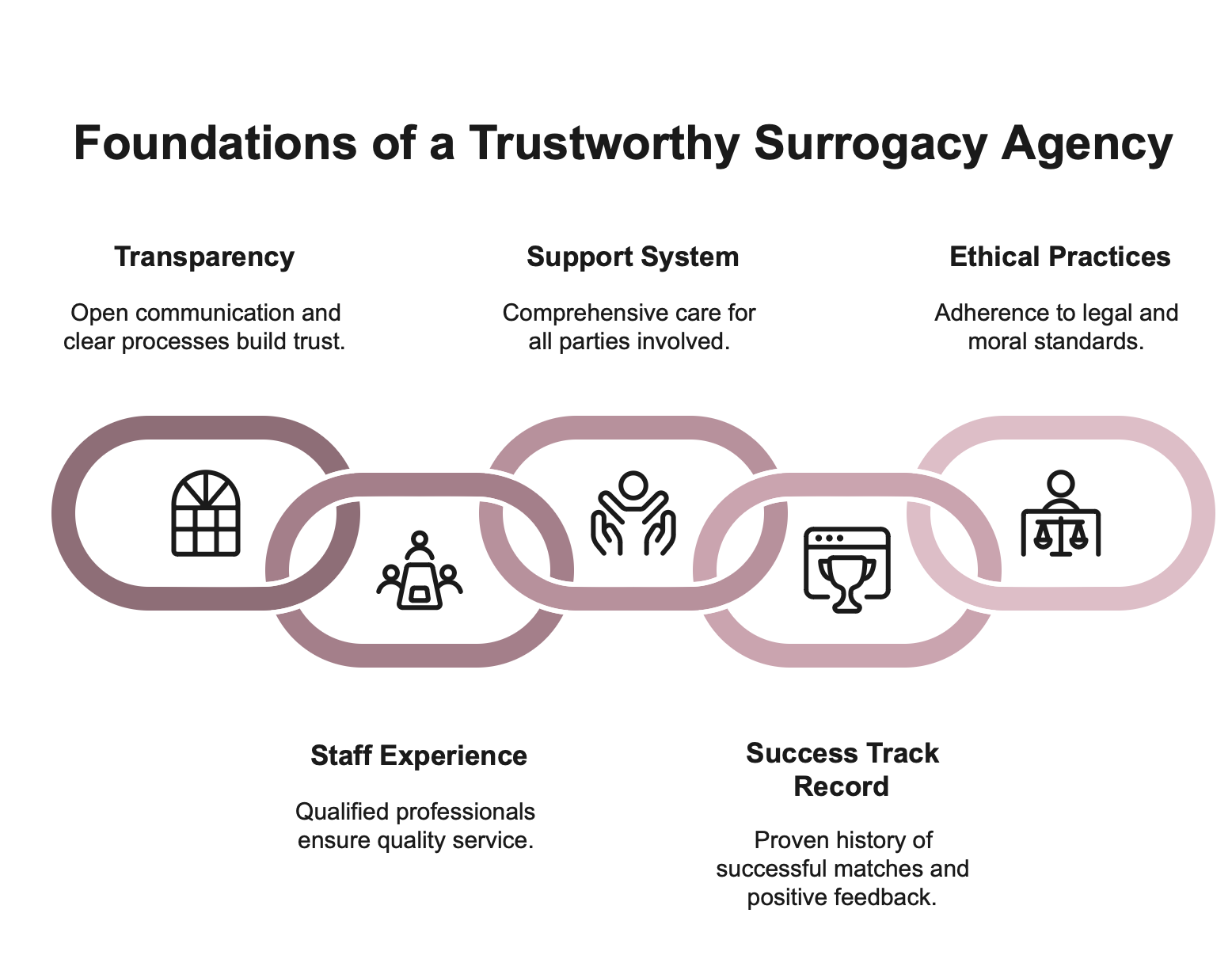
How to Evaluate a Surrogacy Agency
A strong surrogacy journey begins with the right agency, but what exactly makes an agency trustworthy and reputable?
Success stories
Start by looking at how long the agency has been operating. Established agencies usually have proven systems in place and real success stories to show.
Community
Check for online reviews or testimonials from former surrogates and intended parents, and see whether the agency is actively engaged in the surrogacy community.
Memberships
Membership in professional organizations such as SEEDS (Society for Ethics in Egg Donation and Surrogacy) or ASRM (American Society for Reproductive Medicine) is also a strong signal of ethical standards.
Professional partnerships
You should be able to speak directly with an experienced coordinator who walks you through the process step-by-step. Reputable agencies maintain professional partnerships with licensed clinics, attorneys, escrow managers, and counselors who specialize in third-party reproduction.
If you’d like a deeper dive into how to select a reputable agency, visit our complete guide on surrogacy agency selection.
Red Flags in Surrogacy Agencies
No verified reputation
If the agency has no online presence, lacks reviews, or avoids showing testimonials or success stories, that’s a major concern. Transparency is key in this process.
No structured intake process
An ethical agency conducts a thorough screening of both surrogates and intended parents. If you’re not asked for medical history, psychological evaluations, or background checks, they may be skipping essential steps.
You can’t speak to a real person
Agencies that don’t assign you a case manager or who only reply with generic responses show a lack of infrastructure and care.
Pressure to sign quickly
If you’re told to sign contracts or start medical procedures without enough time to understand them, that’s a red flag. You should never feel rushed.
No legal or mental health support mentioned
Surrogacy is both a legal and emotional journey. If the agency doesn’t offer access to independent legal counsel or licensed counselors, proceed with caution.
Weak or outdated digital presence
A professional agency will have a functioning website, active communication channels, and clear contact details.
Unexplained or vague fees
If you’re asked to pay application or coordination fees without a clear explanation, that’s a financial red flag.
No professional affiliations
Agencies not connected with ASRM, SEEDS, or other reputable bodies may not be held accountable to ethical industry standards.
Green Flags in Surrogacy Agencies
A clearly outlined process
Great agencies take the time to explain every step of the journey, from screening to postpartum recovery.
Dedicated support for both parties
Agencies should provide separate coordinators or case managers for surrogates and intended parents, making sure everyone has advocacy.
Access to comprehensive services
These include legal, psychological, medical, and financial support, all with professionals who specialize in surrogacy.
Positive testimonials from real people
Look for stories from former surrogates or families that show how the agency handled both challenges and celebrations.
Affiliations with ethical organizations
Agencies that are members of SEEDS, ASRM, or partner with well-known clinics show a commitment to best practices.
Consistent, respectful communication
You should feel heard and supported, not ghosted or pressured.
Personalized matching approach
Matching should be based on values, communication style, and shared expectations, not just availability.
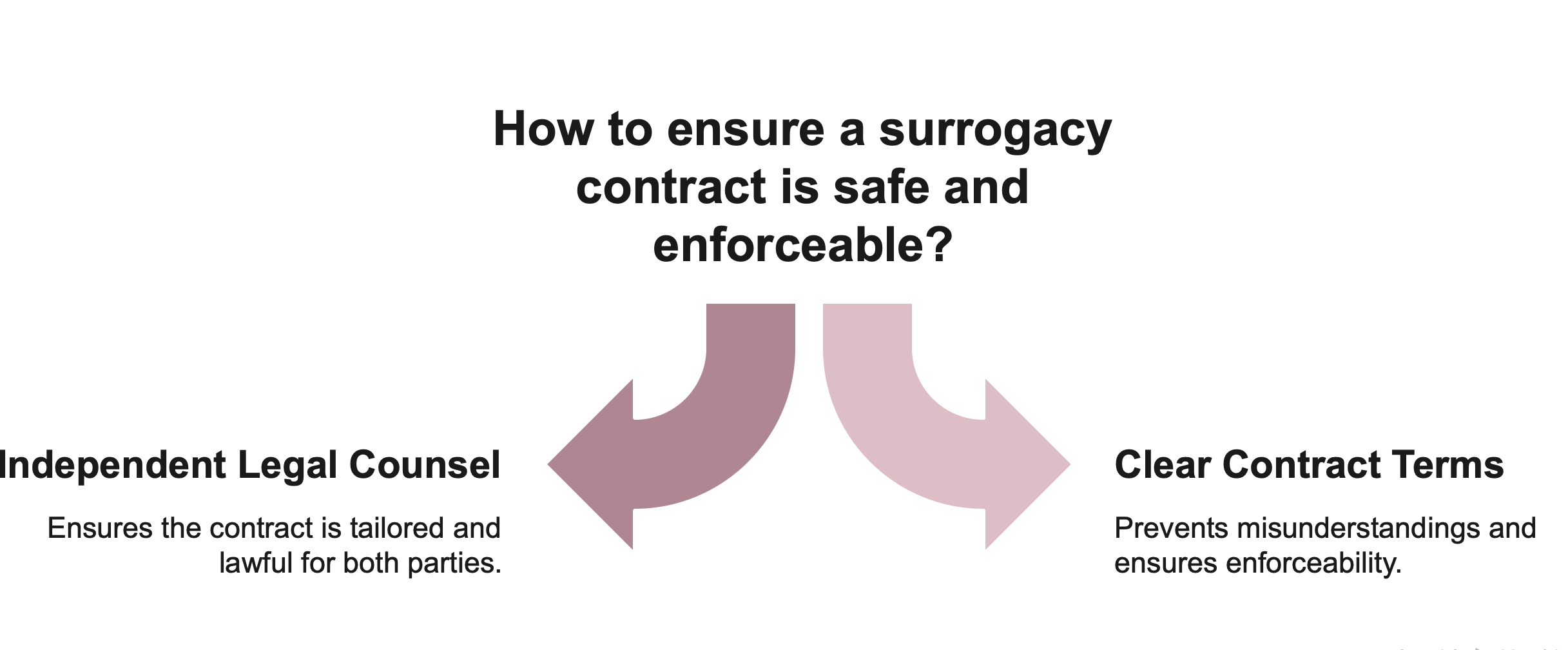
Surrogacy Contracts: What to Look For?
Contracts are your protection. Any reputable agency will provide independent legal counsel for both you and the intended parents, ensuring that your contract is tailored, lawful, and clear.
For more insights on how a surrogacy contract should work, read our legal breakdown article on what makes a contract safe and enforceable.
Red Flags in Surrogacy Contracts
No base compensation outlined
If compensation is vague or missing, that’s a red flag. You should know exactly what you’re being compensated for and when.
No legal counsel offered
You should have your own attorney, not one shared with the intended parents or the agency.
Missing termination clauses or legal protections
A solid contract includes options and protections in case the journey doesn’t proceed as planned.
Unclear financial expectations
Contracts should clearly outline how and when payments are made, and who covers what.
Copy-paste contracts
If your contract doesn’t account for your state laws or unique situation, it may not protect you at all.
Green Flags in Surrogacy Contracts
Full breakdown of compensation
Every aspect, from base pay to childcare, maternity clothes, travel, and bed rest, should be clearly stated.
Example: How much is a surrogate compensated? – SurrogateFirst
Legal support built-in
Reputable agencies ensure both parties have separate, specialized legal counsel.
State-specific terms
Laws vary, so your contract must comply with legal requirements in your jurisdiction.
Termination and breach clauses
Ethical contracts are transparent about what happens if medical or personal situations change.
Emotional and psychological safeguards
Contracts should include support for your mental health and recognize the emotional nature of this journey.
Surrogacy Pricing Transparency
Is it a red flag if a surrogacy agency requires upfront payment before a match is made?
Yes, in most cases. Ethical agencies don’t ask for full payments before any services are delivered. They use third-party escrow systems to hold funds securely and release them according to milestones.
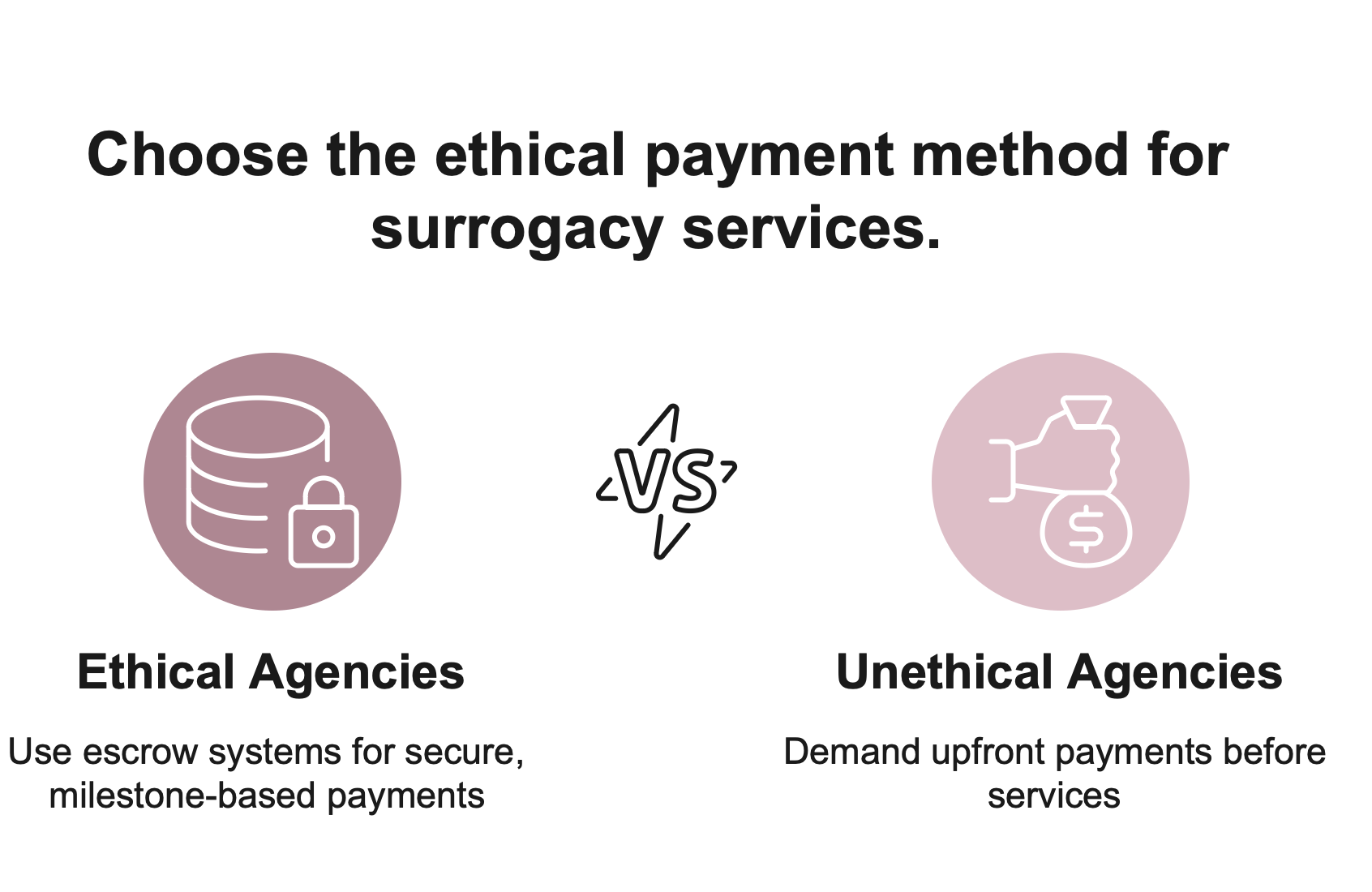
If you’re unsure about how surrogacy payments typically work, we break it down fully in our article about cost and payment timelines.
Red Flags in Payment Practices
Full payment required upfront
No one should be paying thousands of dollars before a surrogate is even screened.
No escrow account
Agencies that manage payments directly without an escrow partner may be mishandling funds.
Vague or no refund terms
You should know what happens to your money if the match doesn’t go forward.
Pressure to pay quickly
If you’re being told “slots are limited” or to “act now,” be skeptical.
Green Flags in Payment Practices
Funds held in escrow
Payments should be handled securely by a licensed, neutral party.
Milestone-based payment schedule
Payments should align with progress in the journey, like contract signing, medical clearance, embryo transfer.
Clear financial documents
You should receive a detailed financial roadmap before making any decisions.
Defined refund and exit policies
Ethical agencies clarify exactly what happens in case of withdrawal, delay, or change.
How to Know Surrogacy Agency is doing a good work with Intended Parent Matching
The match matters. You deserve intended parents who are emotionally ready, financially stable, and respectful throughout the journey.
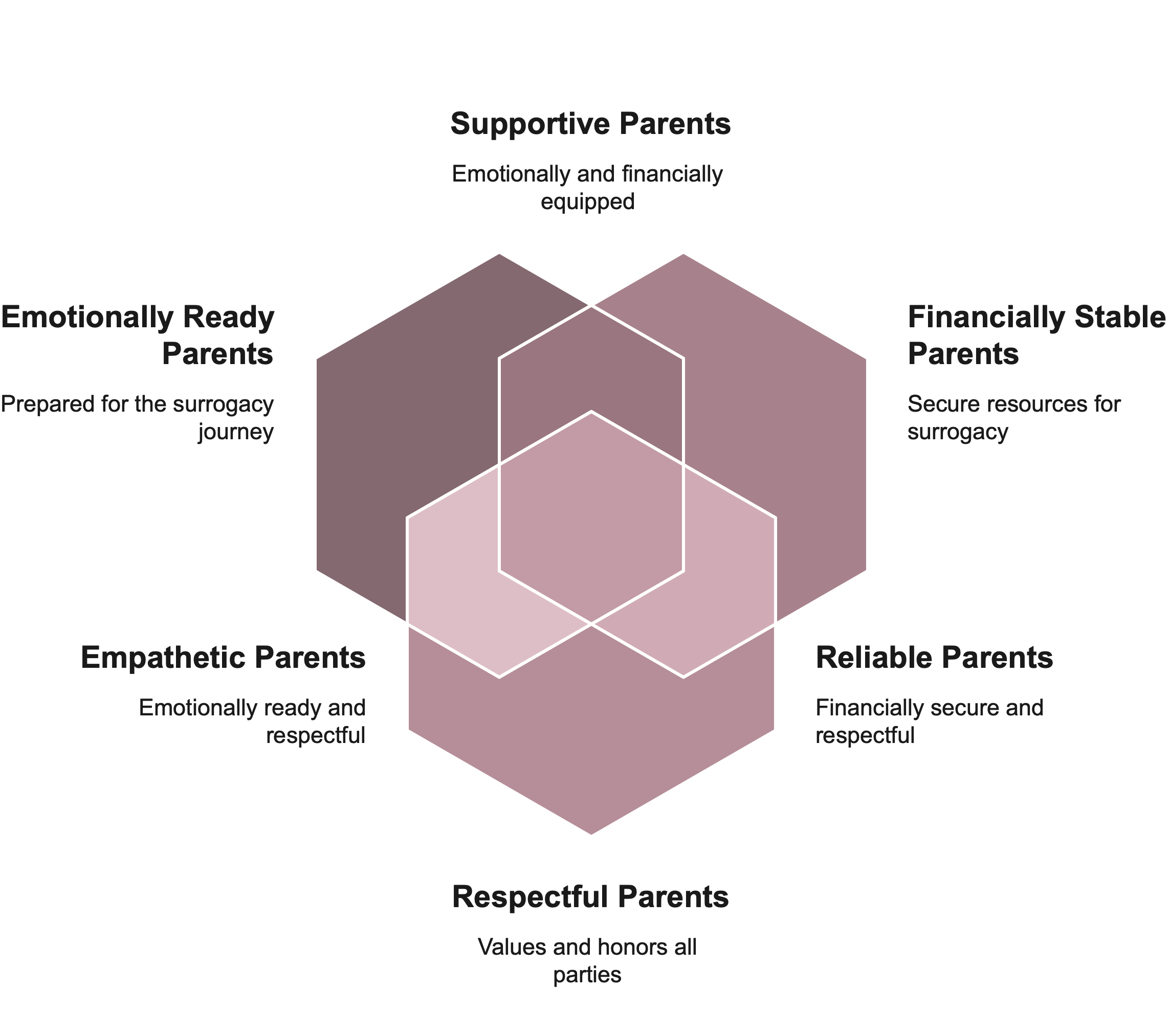
Red Flags in Intended Parent Matching
Lack of transparency
If they avoid sharing their background or values, that’s a red flag.
Unverified finances
Agencies should vet IPs to ensure they are financially capable of supporting the journey.
Poor communication
If you’re already feeling uncomfortable or dismissed early on, it may not get better.
Attempts to go around the agency
IPs who want to communicate or transact outside the contract may put you at risk.
Green Flags in Intended Parent Matching
Open and kind communication
A good IP will make you feel safe, heard, and respected.
Respect for boundaries
Whether you want to stay close or keep things professional, a great match respects your comfort level.
Prepared and informed
Ethical IPs know what to expect and are ready to follow the process, not cut corners.
Aligned values and expectations
Agreements around medical decisions, communication, and relationship post-birth should be in sync.
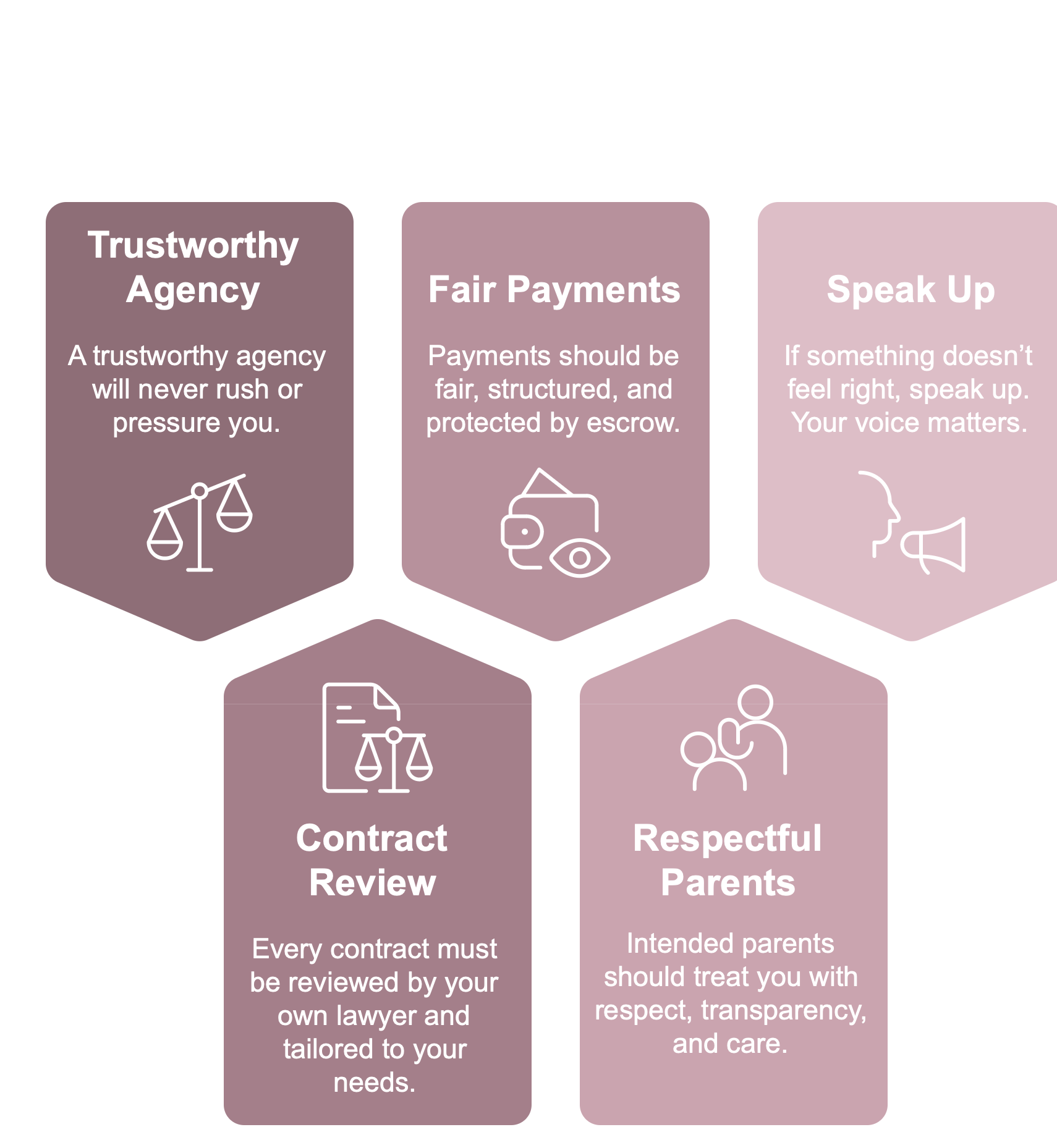
Key Takeaways for Future Surrogates
- A trustworthy agency will never rush or pressure you
- Every contract must be reviewed by your own lawyer and tailored to your needs
- Payments should be fair, structured, and protected by escrow
- Intended parents should treat you with respect, transparency, and care
- If something doesn’t feel right, speak up. Your voice matters.
Why SurrogateFirst?
At SurrogateFirst, we believe that protecting our surrogates is just as important as matching families. We offer unmatched support, clear contracts, independent legal counsel, and access to a dedicated team at every stage. You’ll never feel rushed, ignored, or unprotected. We don’t just build families — we protect the women who help make them possible.





